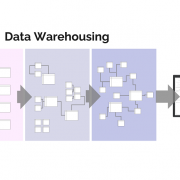How to Efficiently Manage Big Data
The benefits of big data today can’t be ignored, especially since these benefits encompass industries. Despite the misconceptions around big data, it has shown potential in helping organizations move forward and adapt to an ever-changing market, where those that can’t respond appropriately or quickly enough are left behind. Data analytics is the name of the game, and efficient data management is the main differentiator.
A digital integration hub (DIH) will provide the competitive edge an organization needs in the efficient handling of data. It’s an application architecture that aggregates operational data into a low-latency data fabric and helps in digital transformation by offloading from legacy architecture and providing a decoupled API layer that effectively supports modern online applications. Data management entails the governance, organization, and administration of large, and possibly complex, datasets. The rapid growth of data pooIs has left unprepared companies scrambling to find solutions that will help keep them above water. Data in these pools originate from a myriad of sources, including websites, social media sites, and system logs. The variety in data types and their sheer size make data management a fairly complex undertaking.
Big Data Management for Big Wins
In today’s data-driven world, the capability to efficiently analyze and store data are vital factors in enhancing current business processes and setting up new ones. Data has gone beyond the realm of data analysts and into the business mainstream. As such, businesses should add data analysis as a core competency to ensure that the entire organization is on the same page when it comes to data strategy. Below are a few ways you can make big data work for you and your business.
Define Specific Goals
The data you need to capture will depend on your business goals so it’s imperative that you know what these are and ensure that these are shared across the organization. Without definite and specific goals, you’ll end up with large pools of data and nowhere to use them in. As such, it’s advisable to involve the entire team in mapping out a data strategy based on the company’s objectives. This strategy should be part of the organization’s overall business strategy to avoid the collection of irrelevant data that has no impact on business performance. Setting the direction early on will help set you up for long-term success.
Secure Your Data
Because companies have to contend with large amounts of data each day, storage and management could become very challenging. Security is also a main concern; no organization wants to lose it’s precious data after spending time and money processing and storing them. While keeping data accessible for analysis, you should also ensure that it’s kept secure at all times. When handling data, you should have security measures in place, such as firewall security, malware scanning, and spam filtering. Data security is especially important when collecting customer data to avoid violating data privacy regulations. Ideally, it should be one of the main considerations in data management because it’s a critical factor that could mean the difference between a successful venture and a problematic one.
Interlink Your Data
Different channels can be used to access a database, but this doesn’t necessarily mean that you should use several or all of them. There’s no need to deploy different tools for each application your organization uses. One of the ways to prevent miscommunication between applications and ensure that data is synchronized at all times is to keep data interlinked. Synchronicity of data is vital if your organization or team plans to use a single database. An in-memory data grid, cloud storage system, and remote database administrator are just some of the tools a company can use to interlink data.
Ensure Compliance With Audit Regulations
One thing that could be easy to overlook is how compliant systems are to audit regulations. A database and it is conducted to check on the actions of database users and managers. It is typically done for security purposes—to ensure that data or information can be accessed only by those authorized to do so. Adhering to audit regulations is a must, even for offsite database administrators, so it’s critical that they maintain compliant database components.
Be Prepared for Change
There have been significant changes in the field of data processing and management in recent years, which indicates a promising yet constantly changing landscape. To get ahead of the data analytics game, it’s vital that you keep up with current data trends. New tools and technology are made available at an almost regular pace, and keeping abreast of them will ensure that a business keeps its database up to date. It’s also important to be flexible and be able to pivot or restrategize at a moment’s notice so the business can adapt to change accordingly.
Big Data for the Long Haul
Traditional data warehouses and relational database platforms are slowly becoming things of the past. Big data analytics has changed the game, with data management moving away from being a complex, IT-team focused function and becoming a core competency of every business. Ensuring efficient data management means giving your business a competitive edge, and implementing the tips above ensures that a business manages its data effectively. Changes in data strategies are certain, and they may come sooner than later. Equipping your people with the appropriate skills and knowledge will ensure that your business can embrace change with ease.









Leave a Reply
Want to join the discussion?Feel free to contribute!